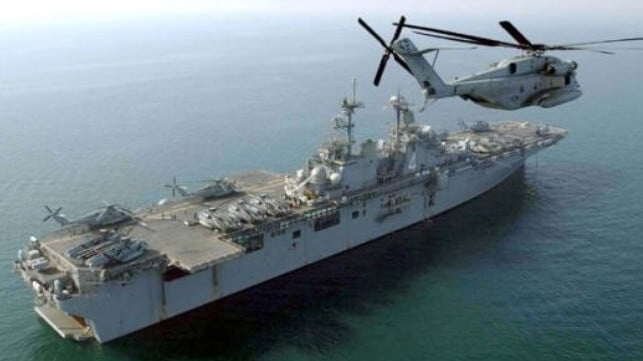Report: Navy Amphib Pumped Fuel Overboard, Fouling Water Intake

An intentional oil discharge can be risky for a ship's crew, resulting in possible fines or (in the United States) criminal penalties. But the crew of the USS Boxer put themselves and their shipmates at a far greater risk when they deliberately pumped fuel over the side in 2016, according to Military.com: they unknowingly contaminated the ship's drinking water supply.
On March 15, 2016, USS Boxer conducted an underway replenishment with the fleet oiler USNS Wally Schirra in the Sea of Japan. She took on about 400,000 gallons of fuel. On the same day, according to Military.com's investigation, crewmembers were ordered to pump fuel over the side. The reasons were not clear, but may have had to do with fuel contamination.
Boxer's crew followed orders and discharged an unspecified amount of fuel into the water. Typically, intentional oil discharges are conducted while under way, often at night or in bad weather. These factors minimize the odds of detection. However, the discharge from Boxer happened while the ship was stationary. The fuel was pumped overboard on one side of the ship, and on the other side, the water intakes for the evaporator were open and running. A substantial amount of diesel fuel was drawn into the intake and entered the water supply.
If this were to occur aboard a commercial vessel on a voyage to a U.S. port, the ship could be detained on arrival for MARPOL violations, and the shipowner and the chief engineer could be charged with a criminal offense. Since Boxer is a warship, and warships are exempt from MARPOL, her crew did not need to worry about the same legal penalties - but some have been paying a steep price nonetheless. The taste of fuel in the water did not go away for days, former crewmembers told Military.com, and they had no choice but to drink and shower with it. Over the years since, some have complained of a range of medical ailments, including cancer (though proving a direct connection is difficult).

that matters most
Get the latest maritime news delivered to your inbox daily.
The water-contamination event aboard USS Boxer is unusual in its details, but fuel in water is a relatively common issue, according to anecdotal reports from veterans. The Navy's big-deck amphibs and carriers - which carry substantial amounts of jet fuel - have a reputation for fuel in the drinking water.
The most recent incident occurred aboard USS Nimitz last September while the carrier was operating off California. The crew reported a foul taste and smell in the drinking water, and 11 crewmembers fell ill with symptoms of fuel ingestion. The ship returned to port so that its water system could be flushed with municipal tap water. Four of the ship's tanks were found to have elevated levels of JP-5; an investigation determined that fuel-laden bilge water had leaked through a gasket on the tank top several years earlier but had not been detected until 2022.
